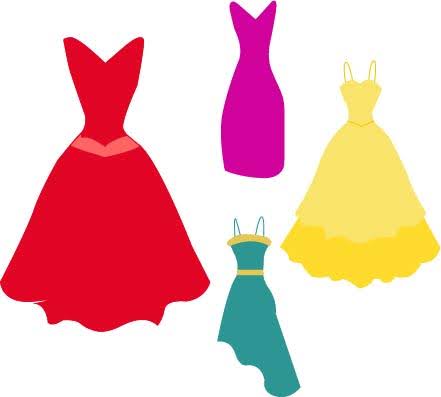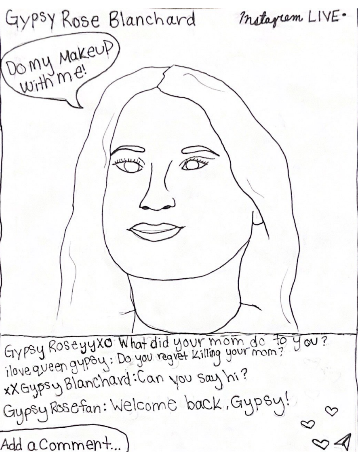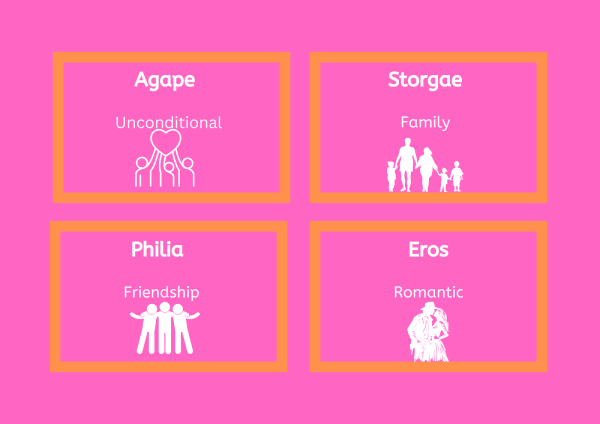Learning to accept my skin

Photo credit: Julia Liagre
The process of trial and error with so many different medications brought on extreme frustration when I looked in the mirror and found nothing seemed to help my skin.
March 16, 2022
In fifth grade, when I first started getting pimples on my face, I looked around my classroom to see all of the other 24 young students with pure, smooth skin. I felt out of place. I felt like while everyone else got to keep their status as mommy and daddy’s little baby, my acne somehow stripped me of my innocence. I remember wearing my hair practically covering my entire face to hide the red blemishes I couldn’t help but pick.
During the summer before sixth grade, my dad and I went to visit family that lives a couple hours away for a weekend. The weather was beautiful. We walked around the farmers market and rode lame roller coasters, which I thought were epic at the time, at a local fair.
“Do you have any ice cream?” I asked after we got home and ate dinner.
“Yes, we have a few flavors in the freezer,” I was told.
I helped myself to a bowl and walked back to the living room to rejoin the conversation.
“Maybe you have all those pimples because of all that ice cream,” one of my family members said, not thinking much of it.
My face turned red and I felt more embarrassed than I ever had until that point. But, I laughed it off and never let anyone know that it got to me. I love my family and know they would never do anything to purposefully hurt my feelings. The comment wasn’t intended to carry so much weight, but it did. It hurt because little did my family member know, I was doing everything I could to clear my skin — countless dermatologists appointments and consistently following their recommendations. God forbid a child enjoy a little bit of ice cream here and there. I think about that moment often. It makes me wonder if people think I have acne because I have bad hygiene, because I don’t care or if I eat a little too much sugar. This one small piece of unsolicited advice has evolved into a continuing fear of assumptions others make about my appearance.
My acne continued to get worse throughout that summer. In July, I went to the state tournament in Midland with the Little League All Star Team. One of the nights, one of my friends on the team and I went into town and out to dinner. We dressed up nice and went to eat at a delicious restaurant. Beforehand, we took pictures in front of a color-filled mural. About a month or so later, I wanted to post one of those pictures on Instagram — but not without editing it first. I downloaded an app called Airbrush, and removed my acne and smoothed my face until I was unrecognizable. I was so proud of it and was so excited to post the picture because I finally liked how I looked. The sad part is, it wasn’t how I looked. Looking back at that picture three years later makes me feel both sad and ashamed. I’m sad that I felt I didn’t live up to our society’s beauty standards and that I had to change my face to make it presentable. I’m ashamed I put out lies and gave people a false impression, although the editing was so extreme I’m positive everyone could tell. I’m certain I will never do that again.
Seventh grade was probably the worst year of my life. My acne was at its peak and my whole face was textured. I was trying out different medications, both topical creams and pills, but nothing seemed to work. One day in my social studies class, I was taken by surprise at the nerve of one of my classmates.
“Want to hear a joke?” the boy I had liked for almost a year asked me.
“Sure,” I replied, not knowing what to expect.
“You know what your forehead looks like?” he asked.
“No,” I said softly, anticipating what he was going to say next.
“A mountain range.”
“Oh.”
That one stung.
My face got red and it was visibly apparent his comment made me upset. The boy could obviously tell he had embarrassed me so he attempted to alleviate the awkward tension by assuring me it was okay because he had acne too. That didn’t really help much. I proceeded to go home and cry, wondering why God couldn’t have chosen a different battle for me. Sometimes, I irrationally blamed my dad for his poor genetics.
Feeling like my skin journey was totally out of my hands made me crave control in other areas of my life. That craving, along with more insecurity and more genetic predisposition, made me start focusing on my food. I wanted complete control over every aspect of it: when I ate, what I ate and how much I ate. I started giving away my lunch to friends at school, and eating dinner at 4 p.m. before anyone else could get home and advise me to have anything other than the foods I considered safe. As time went on, I started eating less and less. The last straw was when my mom caught me flushing down the toilet the two scrambled eggs she made me in fear that if she didn’t feed me before school, I would go the whole day starving. My mom made an appointment at an eating disorder center in Troy that a friend had recommended to her, and at my very first appointment, I was hospitalized. I went in for an intake, to get my story and background information, and at its end the doctors sat my mom, dad and I around a circle table. They explained my heart rate was so slow due to malnutrition that I had no choice but to go to the hospital, and that if my parents refused they would call Child Protective Services. I stayed there for 10 days until I was cleared for release, and have continued to battle the voice in my head telling me not to eat until this very day. That is a journey in itself, but to think I hated my face and acne so much that I began to slowly tear away at my body and make a mess of my insides shows how much that insecurity tore apart my self-confidence and screwed with my brain.
Like many other girls, with acne came makeup. I started wearing foundation to school in seventh grade in an effort to cover up the blemishes. I sat in front of my lighted vanity mirror everyday before school for at least 20 minutes. The bright light made me so painfully aware of every imperfection on my face. I remember lightly skimming across my face with my fingers, feeling every bump and crevice. The combination of my horrible makeup skills and the fact that I had shades far too orange and tan for my skin, made my foundation wearing no secret. A group of mean girls constantly made fun of me for it, but I felt like there was no other option. I’ve since given up makeup, which I feel is a step in the right direction.
When COVID-19 came and masks were required at school, while a nightmare to many others, it felt like a dream to me. I would get to hide my face! And no one would think twice about it because it was required! I became more confident in myself knowing that people could only see from my eyes up. But now, since masks are optional, I just can’t bring myself to take mine off. Not because I’m afraid of catching COVID-19, but because I’m afraid of people finally seeing my acne. I’ve been able to hide behind my mask and use it as a safety blanket, and now that they’re starting to go away I’ve struggled thinking that I’ve been lying to people this past year. My goal is to feel comfortable without my mask by the end of the year, and I really hope I get there.
Just two months ago, I began taking Isotretinoin, which is more commonly known as Accutane. It’s an extremely strong pill described as a last ditch effort to clear your skin after you’ve tried everything else. I’ve been begging my mom to go on it for years now, and she just recently caved in. Previously, she was scared of the numerous possible side effects including depression and loss of appetite. So far, it hasn’t done much to improve my skin, but I am only two months into the process that typically takes four to six. However, it hasn’t failed to give me extremely chapped lips, burning skin, rashes on my hands and dry ears and nose. I’ve stayed up late at night searching “My Accutane Journey” videos on YouTube and TikTok, and most of them end with the person having clear skin and being happier than ever — I’m hopeful I will get the same relief.
I’ve learned that people who don’t want to be my friend or boys that don’t like me because of my acne aren’t people I want in my life anyway. — Julia Liagre
While my skin journey is most likely far from over, the last six years have taught me more about myself and people around me than I would have ever known had I not gone through having acne. I’ve come to the realization that there are so many more interesting things about me than the way my face looks. I’m a hard worker, a good student, a genuine and dependable friend and a caring sister and daughter. I’ve learned that people who don’t want to be my friend or boys that don’t like me because of my acne aren’t people I want in my life anyway. In this way, my skin has been a blessing that has led me to the close circle I have around me today. My skin journey has also made me a better advocate for myself. I’ve had to let my mom or doctors know when something is working or when it’s not, how I’m feeling and when I think something needs to change. Acne has allowed me to see past what people look like, which is a lot easier said than done. It’s helped me form connections with those who also struggle with their skin, and it’s forced me to become more self-assured. So yes, while I’d love to have back all the tears I’ve cried while staring at myself in the mirror wondering why God made me this way, I would never give up all the lessons I’ve learned that have shaped me into the person I am today.












